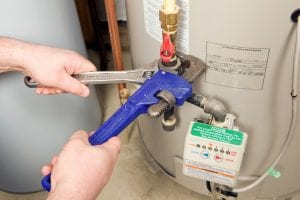
The word corrosion is derived from the Latin word “to gnaw.” And that’s a pretty good description of what corrosion does to metal: it gnaws it away. Corrosion starts when water is in contact with metal in the presence of oxygen, and it’s one of the main enemies of parts of your plumbing system. Even corrosion-resistant copper pipes can suffer from specific types of corrosion.
But we’re here to talk about your water heater, a vital appliance in your home necessary for day-to-day living. Because a storage tank water heater has water in contact with metal, it sounds like a prime candidate for corrosion. Let’s take a look at how corrosion does and doesn’t affect your home’s water heater.
Your Water Heater Is Designed to Resist Corrosion
First, we have some good news. Water heater manufacturers design their products so they resist corrosion for many years. A water heater that starts to corrode right away wouldn’t be much use to anyone! Here are some of the ways a water heater keeps away rust:
- The inside of the tank is lined with glass, keeping the water from coming into contact with the metal.
- Air is kept out of the tank to help prevent the oxidization process. An expansion tank on top of the water tank helps ease pressure inside the tank without allowing contact with air.
- A sacrificial anode rod that runs down through the tank attracts corrosion to it, essentially “sacrificing” itself to corrosion to save the rest of the system. The rod must be replaced when it corrodes completely through, which can be done during regular maintenance.
A Corroded Water Heater Usually Must Be Replaced
Now we come to the bad news. If a water heater starts to corrode, it often means the system needs to be replaced. There aren’t any repairs that can save a water heater tank when it develops corrosion on the inside or outside. If the corrosion is limited to the heat exchanger, burners, or other parts that can be replaced, sometimes the water heater can be repaired. But if corrosion starts in on a system that’s more than 15 years old, the corrosion is an indication the system is too aged and should be replaced no matter what.
Tankless Water Heaters Can Also Corrode
If you have a tankless water heater, you might think that the above information doesn’t apply to you. It’s true that tankless water heaters are less prone to corrosion than systems that use storage tanks. But a tankless water heater can suffer from corrosion if water starts to leak down onto the burners. Rust flakes on the burner can lead to a drop in system efficiency and will require professionals to repair it.
We’re Here to Help
This is the most important thing to know, and the best news of all: when you need any service for water heaters in Chevy Chase, MD, from a minor repair to installing a new tankless water heater, we’re the people for the job. We’ve built our company on honesty and integrity, and we’ll see that every job we do is done right!
Mallick Plumbing & Heating is the Service Contractor of Choice throughout Silver Spring, MD & Montgomery County.
